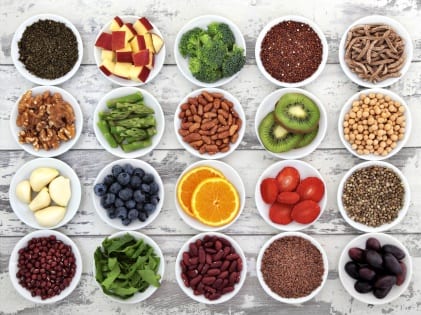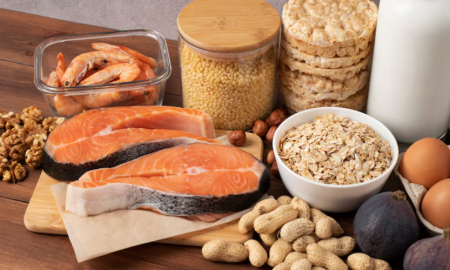
The F-Factor Diet: Is It Really Good For You?

The F-Factor Diet seems to be the latest fad as far as diet plans are concerned. A few experts have been claiming that by following the diet plan religiously, an individual can shed off around 8 to 10 pounds in the very first month of starting it. Additionally, anybody on the F-Factor diet would feel no pangs of hunger or feel deprived for a long period of time. If you embrace this diet plan, you will become less prone to cardiovascular diseases since you are consuming almost 25 to 29 grams of fiber each day. The figures are inspiring as compared to those who take in about 20 grams or even less in a day. But how healthy is this F-factor diet? Is it worth? Let’s find out.
What Exactly Is The F-Factor Diet?
 According to experts, the F-Factor diet is a lifestyle that mainly revolves around the intake of high-fiber carbs combined with protein-rich food during each meal. This mainly helps with your hunger pangs and prevents you from consuming extra calories. Fiber present in the F-Factor diet also helps in improving the levels of cholesterol and blood sugar in your body. As per the United States dietary guidelines, around a whopping 95% of Americans don’t meet the fiber requirement on a daily basis. They are nowhere near the optimum levels of 38 grams for men and 25 grams for women. Exercise is not promoted in this particular diet plan as working out tends to accentuate your appetite and you would eventually eat more calories than you are likely to burn at the gym.
According to experts, the F-Factor diet is a lifestyle that mainly revolves around the intake of high-fiber carbs combined with protein-rich food during each meal. This mainly helps with your hunger pangs and prevents you from consuming extra calories. Fiber present in the F-Factor diet also helps in improving the levels of cholesterol and blood sugar in your body. As per the United States dietary guidelines, around a whopping 95% of Americans don’t meet the fiber requirement on a daily basis. They are nowhere near the optimum levels of 38 grams for men and 25 grams for women. Exercise is not promoted in this particular diet plan as working out tends to accentuate your appetite and you would eventually eat more calories than you are likely to burn at the gym.
How Much Carbohydrate Is Allowed?
 As discussed earlier, the F-Factor diet is all about the total number of carbohydrates you are consuming in a single day. As you can’t digest the carbs that you get from fiber, you just calculate the net carbs that you can digest by subtracting the total fiber content from the net carbohydrate that’s written on the label. Dieters who follow this particular plan go through a few phases and take their net consumption of carbohydrates to the next level. Phase 1 requires you to consume less than 35 grams of total carbs in a day. You can take in around three servings. Phase 2 requires you to consume less than 75 grams of carbs in a day. That comes to around six servings. Next comes the maintenance phase. You can consume carbs not more than 125 grams every day or around nine servings or so.
As discussed earlier, the F-Factor diet is all about the total number of carbohydrates you are consuming in a single day. As you can’t digest the carbs that you get from fiber, you just calculate the net carbs that you can digest by subtracting the total fiber content from the net carbohydrate that’s written on the label. Dieters who follow this particular plan go through a few phases and take their net consumption of carbohydrates to the next level. Phase 1 requires you to consume less than 35 grams of total carbs in a day. You can take in around three servings. Phase 2 requires you to consume less than 75 grams of carbs in a day. That comes to around six servings. Next comes the maintenance phase. You can consume carbs not more than 125 grams every day or around nine servings or so.
Food That You Can Consume When You Are On The F-Factor Diet
 Foods that are recommended during the course of this dietary plan usually have low quantities of carbohydrates. The list comprises of beans and legumes, veggies with high fiber content such as carrots, beets, cauliflower, broccoli, and sweet potatoes, fruits like oranges, apples, pears, and berries, whole wheat bread, cereals laden with fiber, GG crackers, nut butter, and eggs. F-Factor protein bars and powder are also highly recommended. You can have alcohol but within permissible limits. You can follow the chart when you are out dining — there shouldn’t be any issues with that.
Foods that are recommended during the course of this dietary plan usually have low quantities of carbohydrates. The list comprises of beans and legumes, veggies with high fiber content such as carrots, beets, cauliflower, broccoli, and sweet potatoes, fruits like oranges, apples, pears, and berries, whole wheat bread, cereals laden with fiber, GG crackers, nut butter, and eggs. F-Factor protein bars and powder are also highly recommended. You can have alcohol but within permissible limits. You can follow the chart when you are out dining — there shouldn’t be any issues with that.
Is The Diet Good For You?
 Fiber is indeed great for you. Foods that boast of high fiber content are healthy for the human body. As a major part of your daily diet, you focus on consuming fruits, vegetables, whole grains, seeds, beans, and nuts. These food items are composed of minerals, vitamins, phytochemicals, and antioxidants. Fiber is indispensable when it comes to lowering the levels of cholesterol in your blood, decreasing the risks of high blood pressure and cardiovascular disease, and cutting down inflammation as well. Many experts are of the opinion that the F-Factor diet can ward off the risk of various types of cancers, too. The FDA or Food Drug Administration, as well as the American Diabetes Association, don’t recognize the term “net carbs”, but they do recognize the distinction between soluble fiber and insoluble fiber.
Fiber is indeed great for you. Foods that boast of high fiber content are healthy for the human body. As a major part of your daily diet, you focus on consuming fruits, vegetables, whole grains, seeds, beans, and nuts. These food items are composed of minerals, vitamins, phytochemicals, and antioxidants. Fiber is indispensable when it comes to lowering the levels of cholesterol in your blood, decreasing the risks of high blood pressure and cardiovascular disease, and cutting down inflammation as well. Many experts are of the opinion that the F-Factor diet can ward off the risk of various types of cancers, too. The FDA or Food Drug Administration, as well as the American Diabetes Association, don’t recognize the term “net carbs”, but they do recognize the distinction between soluble fiber and insoluble fiber.
The changes in your weight will be determined by the number of calories that you take. Fiber has a key role to play in your weight loss. Foods that contain fiber in optimum quantities generally contain calories in low quantities. Consuming fiber-laden foods can make you feel satiated and full. Are you going for the F-Factor diet or not?
More in Diet
-
`
How Good Is Alkaline Water For Kidneys?
Is alkaline water good for kidneys? This question has sparked a lot of interest, particularly among health enthusiasts and those seeking...
June 18, 2024 -
`
Inspirational! Chrissy Metz’s Weight Loss Journey
Chrissy Metz’s weight loss journey and transformation is a testament to her resilience and determination. Best known for her heart-wrenching role...
June 10, 2024 -
`
First Date Questions for Engaging and Fun Conversations
First dates: a thrilling mix of excitement and butterflies. You want to impress, have engaging conversations, and discover if there’s a...
June 4, 2024 -
`
12 Gut Health Drinks to Boost Your Digestive Health
Maintaining a healthy gut is crucial for overall well-being, impacting everything from digestion to immunity and even mood. While there are...
May 31, 2024 -
`
Can I Workout After Botox? Discovering the Dos and Don’ts
Smoothing out those frown lines and crow’s feet with BOTOX® can do wonders for your youthful appearance. But if you’re an...
May 23, 2024 -
`
Essential Steps to a Millionaire Morning Routine
Ever wondered what separates the high achievers from the rest? It all boils down to habits, and successful people cultivate routines...
May 16, 2024 -
`
Amalfi Coast vs Cinque Terre – Which Coastal Haven Suits You?
Choosing between Italy’s stunning coastal destinations, Cinque Terre and the Amalfi Coast, can be akin to picking your favorite flavor of...
May 9, 2024 -
`
How Is a Fad Diet Different Than a Low Calorie Diet?
We often find ourselves on the hunt for the perfect diet to shed those extra pounds, and in this quest, two...
May 2, 2024 -
`
Does Diet Soda Break a Fast? Unraveling the Myths and Facts
Intermittent fasting has gained significant popularity in recent years as a method for weight loss, improved metabolism, and overall health benefits....
April 24, 2024










You must be logged in to post a comment Login